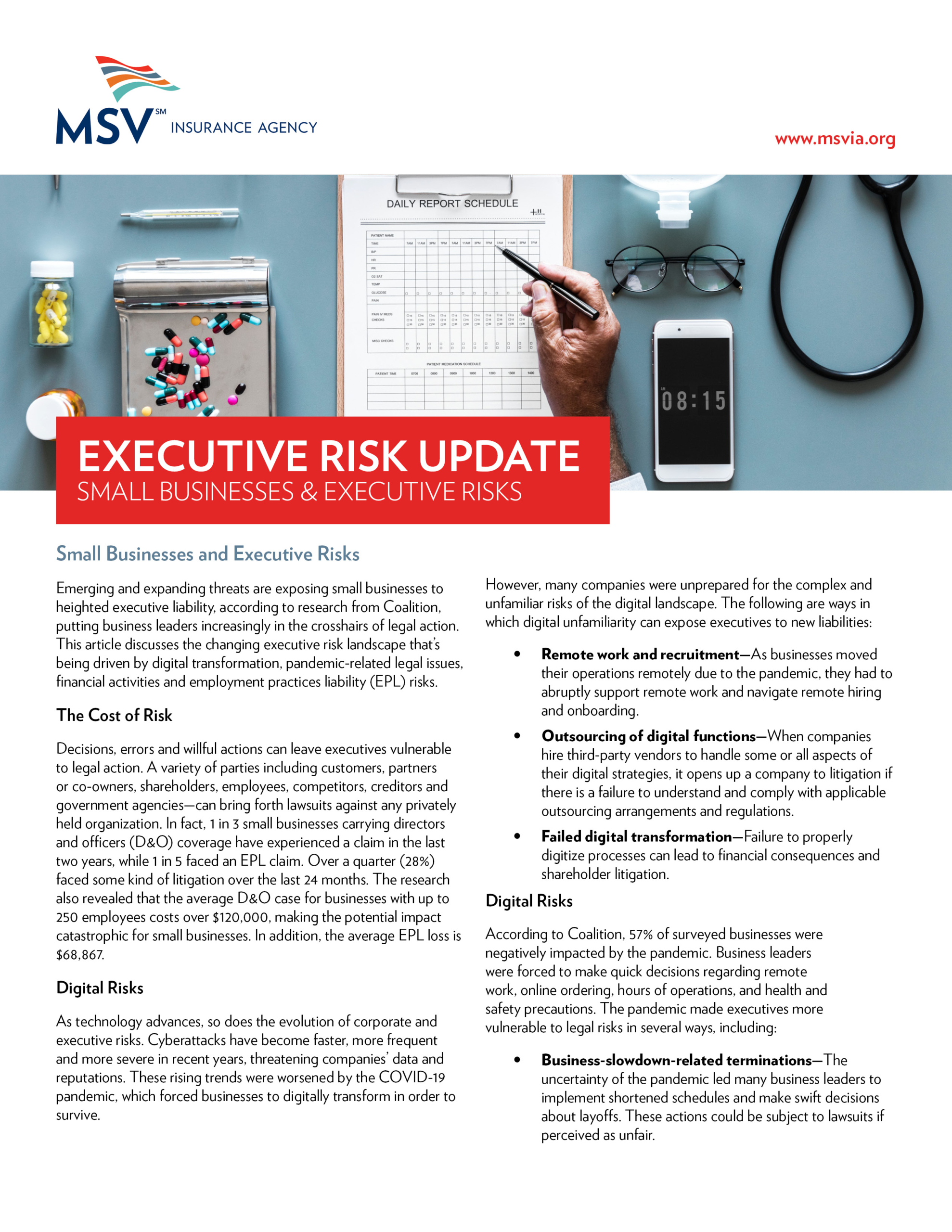In fact, 1 in 3 small businesses carrying directors and officers (D&O) coverage have experienced a claim in the last two years, while 1 in 5 faced an EPL claim. Over a quarter (28%) faced some kind of litigation over the last 24 months. The research also revealed that the average D&O case for businesses with up to 250 employees costs over $120,000, making the potential impact catastrophic for small businesses. In addition, the average EPL loss is $68,867.
Digital Risks
As technology advances, so does the evolution of corporate and executive risks. Cyberattacks have become faster, more frequent and more severe in recent years, threatening companies’ data and reputations. These rising trends were worsened by the COVID-19 pandemic, which forced businesses to digitally transform in order to survive.
However, many companies were unprepared for the complex and unfamiliar risks of the digital landscape.
The following are ways in which digital unfamiliarity can expose executives to new liabilities:
- Remote work and recruitment—As businesses moved their operations remotely due to the pandemic, they had to abruptly support remote work and navigate remote hiring and onboarding.
- Outsourcing of digital functions—When companies hire third-party vendors to handle some or all aspects of their digital strategies, it opens up a company to litigation if there is a failure to understand and comply with applicable outsourcing arrangements and regulations.
- Failed digital transformation—Failure to properly digitize processes can lead to financial consequences and shareholder litigation.
Pandemic-related Risks
According to Coalition, 57% of surveyed businesses were negatively impacted by the pandemic. Business leaders were forced to make quick decisions regarding remote work, online ordering, hours of operations, and health and safety precautions. The pandemic made executives more vulnerable to legal risks in several ways, including:
- Business-slowdown-related terminations—The uncertainty of the pandemic led many business leaders to implement shortened schedules and make swift decisions about layoffs. These actions could be subject to lawsuits if perceived as unfair.
- Paycheck Protection Program (PPP) and Economic Injury Disaster Loan (EIDL) fraud—During the pandemic, fraud involving the SBA’s PPP and EIDL resulted in numerous investigations by the IRS, FBI and Justice Department. Even simple issues—such as mismatching company information from government records—can lead to costly defense fees in a fraud investigation.
- COVID-19-related employer obligations—Executive orders and federal regulations regarding health and safety precautions, including the vaccine, could affect business owners who fail to comply.
- Employer-mandated COVID-19 precautions—Many legal challenges surfaced during the pandemic as private employers had to decide whether to institute vaccination or testing requirements for employees. Companies could face EPL litigation if they fire an employee “for cause” for refusing to receive the vaccine. At the same time, other workers have sued employers for failing to adopt or adhere to policies and procedures that decrease COVID-19 exposure.
- Customer vaccination proof cases—Some companies require patrons to show proof of vaccination before entering their premises. However, some governors have issued executive orders to prevent businesses from demanding proof.
- Price-gouging lawsuits—Several lawsuits have come forward during the pandemic as consumers accuse companies of inflating prices for high-demand products, such as N95 masks and sanitizing supplies.
- Denial of refund cases—Consumers have filed numerous lawsuits against companies that refused refunds for travel, gym memberships, hospitality reservations and entertainment events that were disrupted due to the pandemic.
Financial Risks
Financial-activity litigation is typically covered under a D&O policy, and uninsured companies can suffer catastrophic losses. The following financing activities can leave D&Os susceptible to exposure and risk:
- Merger objection litigation—Shareholders are increasingly accusing company officers of conducting mergers that involve conflicts of interest.
- Special-purpose acquisition company (SPAC) class actions—To fast-track an initial public offering, many companies choose to form an SPAC—a shell company with the sole purpose of merging or acquiring. However, inadequately disclosing SPAC information to shareholders may result in lawsuits and SEC investigations.
- Bankruptcy filings—Many retailers, restaurants and other small businesses were forced to file
bankruptcy due to the pandemic. Such filings can lead to lawsuits alleging that bankruptcy directly resulted from D&Os’ acts, errors or omissions.
- Other fiduciary issues—Breaches of contract, fraud, conspiracy and unfair treatment of shareholders can all expose company executives to litigation.
EPL Risks
EPL risks can be related to both employment matters and a company’s environmental, social and governance practices. According to Coalition, 26% of companies with 100 or more employees experienced an EPL claim in the last two years. EPL-related litigation can result from issues regarding:
- Diversity, inclusion and equity
- Discrimination or harassment
- Wrongful termination
- Employee benefits mismanagement
- Activism incidents
- Employee fraud
- Whistleblowing
- Health and safety violations
Conclusion
The most common reason businesses don’t purchase executive risk coverage—including D&O, EPL, fiduciary liability and crime—is because they believe their businesses are too small to need it. However, any privately held organization’s officers, board members or employees can be sued over the decisions, errors, willful actions or even statements they make. For more executive risk coverage information, contact us today.



